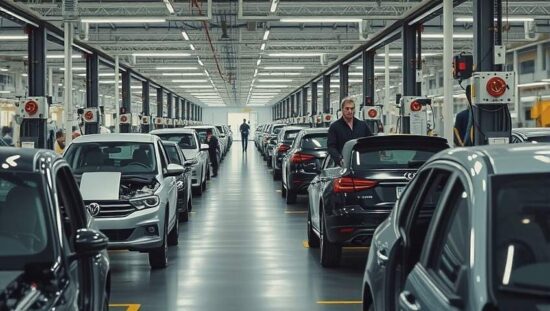Germany’s industrial landscape is undergoing a significant contraction, with alarming job losses particularly concentrated within the automotive sector, according to data released Thursday by the Federal Statistical Office (Destatis). The sector has shed 48,700 jobs, representing a 6.3% decline since the third quarter of 2024 – a rate exceeding any other major industry employing over 200,000 individuals.
The workforce in the automotive industry has plummeted to 721,400, marking its lowest level since the second quarter of 2011. While it remains the second-largest industrial employer after mechanical engineering, the severity of the contraction raises serious questions about the sector’s long-term viability and its contribution to the German economy.
The broader manufacturing sector also experienced a decline, losing 120,300 jobs, a 2.2% drop year-on-year. However, the automotive sector’s slump is disproportionate, suggesting a more acute crisis driven by factors beyond general economic headwinds.
The job losses are not evenly distributed within the auto industry. Suppliers are bearing the brunt of the downsizing, facing significantly steeper declines than established automobile manufacturers. While manufacturers lost 3.8% of their workforce in vehicle and engine production, supplier businesses specializing in car body components and trailers suffered a 4.0% reduction. Most alarming is the 11.1% drop among suppliers of vehicle parts and accessories, indicating a potential fragility within the secondary supply chain.
Beyond automotive, job losses are prevalent across significant industrial pillars. Metal production and processing have seen a 5.4% contraction, while data processing equipment, electronic and optical product manufacturing has shrunk by 3.0%. The plastics and metal products industries also demonstrate worrying trends.
Even the traditionally resilient mechanical engineering sector, employing approximately 934,200, witnessed a 2.2% decrease, underscoring the widespread nature of the industrial downturn. Only the food industry bucked the trend, experiencing a relatively moderate increase in employment.
The situation demands a critical examination of government policy and industrial strategy. The uneven distribution of job losses suggests vulnerabilities requiring targeted intervention. Critics argue that the ongoing shift towards electric vehicles and a lack of decisive support for homegrown battery technology may be contributing to the sector’s struggles. Furthermore, the reliance on global supply chains and potential trade tensions are exacerbating existing challenges, leaving Germany’s industrial base increasingly exposed. The long-term consequences of these job losses, including potential social unrest and economic stagnation, cannot be ignored.





